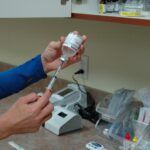Breast cancer diagnosis has improved over the years, leading to an increasing number of surgical tumour resections in specific breast conservative surgery. An innovative probe for detecting breast cancer tissue during operation could improve retention of healthy tissue and improve local treatment outcome.
As with most cancer operations, breast conserving surgery aims to completely remove cancer with clear surgical margins while maintaining the natural shape of the breast. However, this is not always possible, leading to breast deformity and residual cancer in 20-30 % of patients who require reoperation after a partial mastectomy. Apart from patient dissatisfaction this contributes to increased health care costs and poorer cosmetic results.
An intra-operative probe for cancer tissue
ONCOscanner is an innovative solution that enables intra-operative recognition of collected tissues during surgical removal of cancerous breast tissue. As the coordinator of the EU-funded ONCOscanner project Dr Stanislaw Rogozinski explains, “the ONCOscanner probe supports surgeons by allowing them to assess margins of the breast cancer tissue during operation.″
The ONCOscanner probe has the capacity to identify cancerous tissue during surgery. Through the dielectric technique, it measures the electric conductivity and permeability of normal and malignant tissue. Electric properties are lowest in fat tissue and high in cancerous tissue, allowing the differentiation between healthy and malignant breast tissue.
Importantly, the ONCOscanner probe has been designed to overcome the influence of components with high electrical conductivity such as blood, plasma and electrolytes. It can be used repeatedly during operation without the need of irradiation or special training. The probe has also been validated in many medical experiments and demonstrated absolute safety, very high sensitivity (87 %) and specificity (99 %).
Effective candidate drug combination for treatment of triple negative breast cancer
Most forms of breast cancer express the three target receptors ER, PR and HER2, and as such have more sustainable therapies. TNBC is difficult to treat successfully. Aptly named due to the lack of these three targetable receptors, the mainstay practice for TNBC in the clinic is to treat with non-targeted cytotoxic chemotherapies.
Researchers with the EU-funded TRIPLECON project have already discovered with the aid of a European Research Council advanced grant that an inhibitor targeting cyclin-dependent kinase 9 (CDK9) strikingly synergises with drugs targeting the EGFR receptor family. This signals inhibition of cell proliferation of TNBC cell lines and directs these cells towards programmed cell death, apoptosis.
The overall goal of the TRIPLECON project was to “exploit this novel finding and provide proof-of-concept (PoC) evidence that stalling CDK9 signalling may enable successful targeted combination therapy in TNBC,” outlines Prof. John Martens of project coordinator Erasmus University Medical Center, Rotterdam. The research team used TNBC patient-derived xenograft (PDX) mouse models in vivo to test the safety of the new synergistic treatment.
More Information
Full news “intraoperative probe for breast cancer tissue”
Full news “rug combination for treatment of triple negative breast cancer”







Leave a Reply